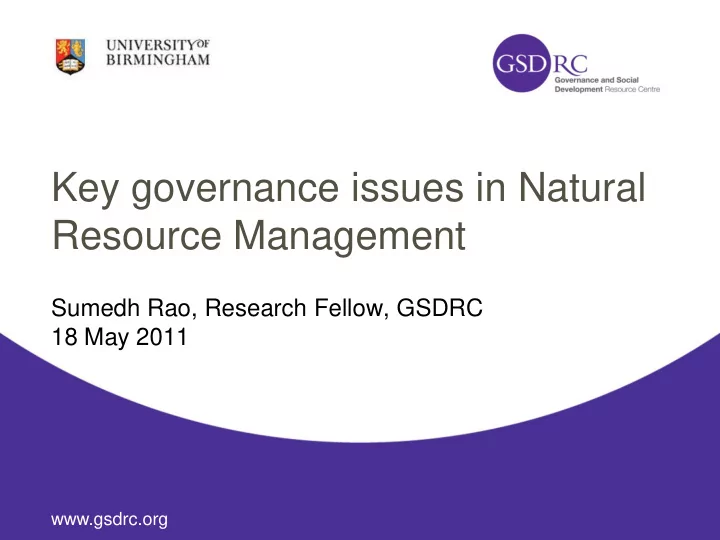

Key governance issues in Natural Resource Management Sumedh Rao, Research Fellow, GSDRC 18 May 2011 www.gsdrc.org
Key issues • ‘Resource curse’ • Complexity and multi-level governance • Decentralisation and local governance • Trade regulation • Transparency and wider governance reform • Sustainable and inclusive growth
‘Resource curse’ • Evidence is inconclusive • Poor economic management is the cause of poor economic performance. • Natural resource abundance contributes in different ways to the onset, duration, intensity and type of civil wars. • Natural resource abundance can prevent cultural and social changes that facilitate democratisation. Rosser, 2006
‘Resource curse’ • Do not assume a deterministic relationship between natural resource abundance and negative developmental outcomes. • Many suggestions not politically feasible • Should focus on: • Change at the international level • Helping poor countries cope with international commodity price instability Rosser, 2006
Complexity and multi-level governance • Operate under: • Uncertainty • Unpredictability • Information deficit • Past behaviour not predictor of future behaviour • Rapid, fundamental, and possibly detrimental change Duit et al, 2010; Steffer et al, 2004
Complexity and multi-level governance • Requires: • Complex System Perspective • Both flexibility and stability • ‘ Adaptive Governance systems’ • Self-organising social networks • Draw on various knowledge and experiences • Creative co-operative management efforts Voss et al, 2006, Folke et al, 2005
Complexity and multi-level governance • GoverNat • Multi-level Governance of Natural Resources • Water and biodiversity resources in Europe • Analytical and participatory processes improve multi-level governance Governat, 2010
Complexity and multi-level governance • To improve multi-level governance processes: • Manage expectations of participants • Adapt to context • Interact with multiple actors • Involve bottom-up initiatives • Recognise and share benefits and costs Governat, 2010
Decentralisation and local governance • Natural resources are a source of revenue and power • Various types of local governance arrangements • Competing for control of various resources including natural resources • Decentralisation can create space for political negotiation at a district level Joshie et al., 2008
Decentralisation and local governance • Local natural resource management can: • Legitimise local authorities • Engage local people with local government • Promote representative, accountable and equitable processes Joshie et al., 2008
Decentralisation and local governance • Mixed evidence on impact on resource availability: • Bhilwara District of Rajasthan, India: greater biomass availability in the commons governed by the village institutions (Joshie et al., 2008). • Andhra Pradesh, Madhya Pradesh and Karnataka, India: Decentralisation has not significantly increased the rural poor’s access to natural resources (Baumann and Farrington, 2003)
Trade regulation • Natural resources account for approximately 15% of world trade • Many resource producers dependent on resource exports for: • foreign exchange • fiscal revenue • Regional and international trade rules impact on domestic and local governance of natural resources Collier and Venables, 2009
Trade regulation • Unlike other goods, natural resources are: • Immobile • Depletable • Require long-term discovery and development projects • Produce rents (i.e. profit), which investors and consumer countries get a disproportionate share of • Natural resource regulation should be distinctive from other trade regulation Collier and Venables, 2009
Trade regulation • Natural resource trade regulation should: • Allow cartels • Allow resource revenue-funded ancillary industries • Promote commitment to extraction • Promote technologies for extraction and contingencies • Improve the process of selling extraction rights Collier and Venables, 2009
Trade regulation • Export taxes, import tariffs and subsidies may be justified to address: • Volatility of commodity prices • Dominance of natural resources in a domestic economy • Shifting economic rents: • from the exporting to the importing country (import tariffs) • shift rents from the extracting company to the government (export taxes) • from the future to the present (export quotas) WTO, 2010
Transparency and wider governance • Extractive Industry Transparency Initiative (EITI) • EITI countries showed: • Improved business climate • Markedly improved voice and accountability • Links between transparency and wider governance are unclear Aaronson, 2008
Sustainable and inclusive growth • Namibia and Kenya study in rural sustainable livelihoods: • Occasional fit between NRM initiatives and sustainable rural livelihoods • This varied from context to context Catacutan et al., 2001
Sustainable and inclusive growth • Factors affecting success and sustainability of local NRM in Philippines: • Clear local financial investment • Enhanced local technical capacity • Sound political culture conducive to natural resource management • A supporting National Mandate Catacutan et al., 2001
Key governance issues in Natural Resource Management Sumedh Rao, Research Fellow, GSDRC 18 May 2011 www.gsdrc.org
Recommend
More recommend